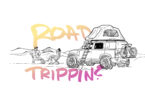What does the future hold? How is AI changing art and culture? Which AI tools are artists “allowed” to use, and which not? We discussed the future of music with lead singer and producer Rosi from Circuit Minds – a band that doesn’t even exist. Inevitably, we also talked about how we define art and reality when they’re shaped by algorithms. Where do you draw the line between the creative process and a lie?
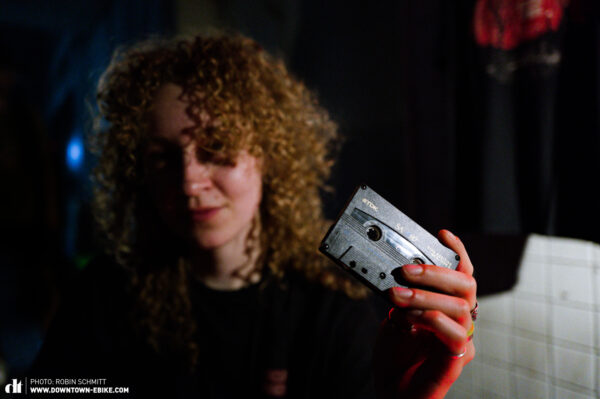
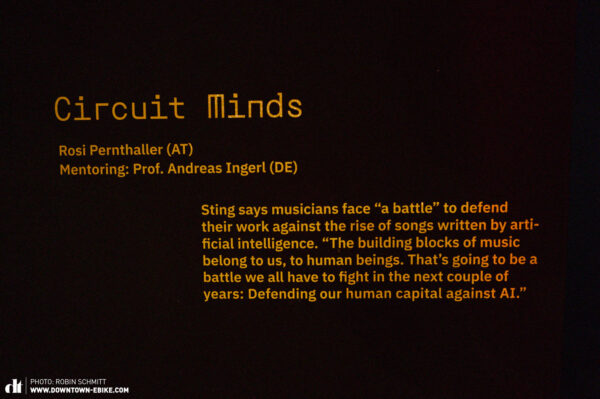
Is digital less “real” than analogue? Artificial intelligence isn’t just redefining our day to day lives, but also our art and culture. The boundaries between truth and falsehood, art and artificial have never been more blurred. However, is AI-generated art any less valuable and less genuine than human art? We spoke with lead singer and music producer Rosi (24) from Circuit Minds – a band that doesn’t exist – at Ars Electronica in Linz. With the help of AI tools, Rosi founded the band as a term paper for the “Craving Future Realities” course, produced an album, and also created all the band’s marketing material with AI. After hearing the first AI song of our lives on an analogue cassette player, she explains to us why the process deadened something inside of her.
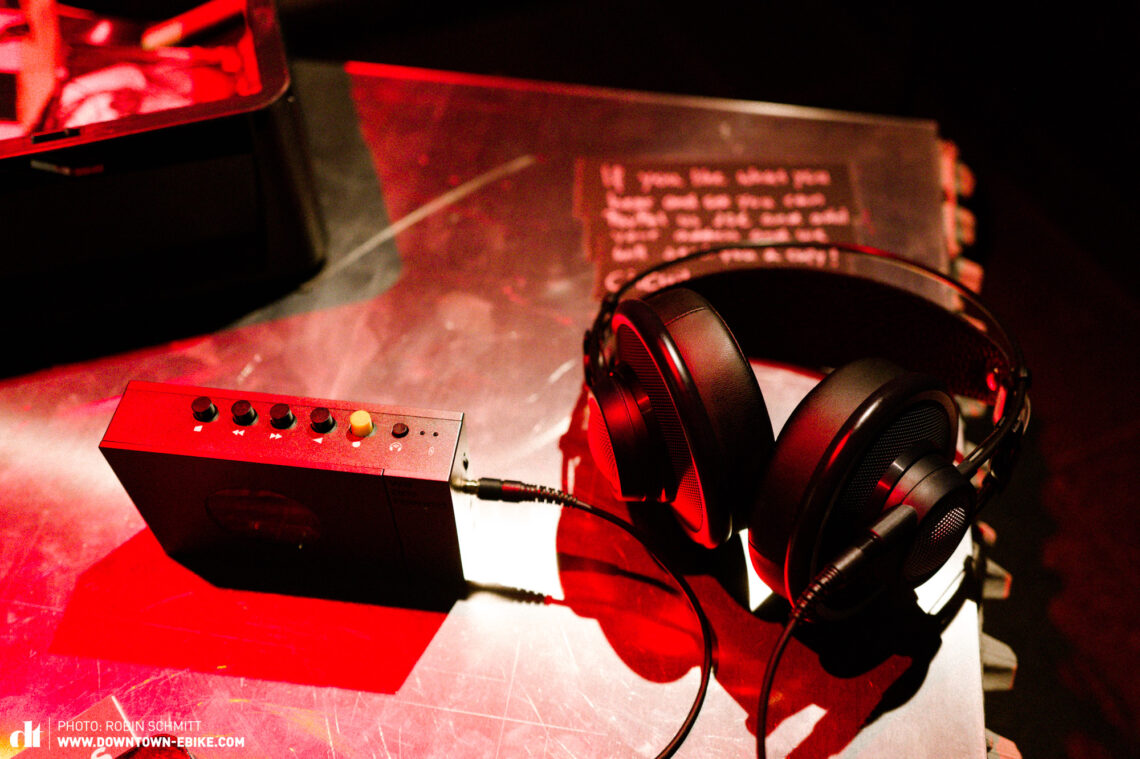
DOWNTOWN: Rosi, how did you come to form a band without actual band members?
Rosi: It was a pretty selfish thought. I wasn’t quite sure what I wanted to do for my term paper. I knew I wanted to do something on my own, and I wanted to do something where I could be “me”. I’ve always wanted to make music with cool people, but somehow I also find people very exhausting – that’s why I never pursued this idea in the past. For the term paper, I thought to myself: wait, maybe there is a way to generate an entire band with AI tools? And that’s how this project came about. First, it was supposed to be a punk band, with me as the lead singer. That didn’t work so well. However, I am still very happy with the result and how it eventually turned out, which is an all-female or non-male synthwave band in which the singer is based on me.
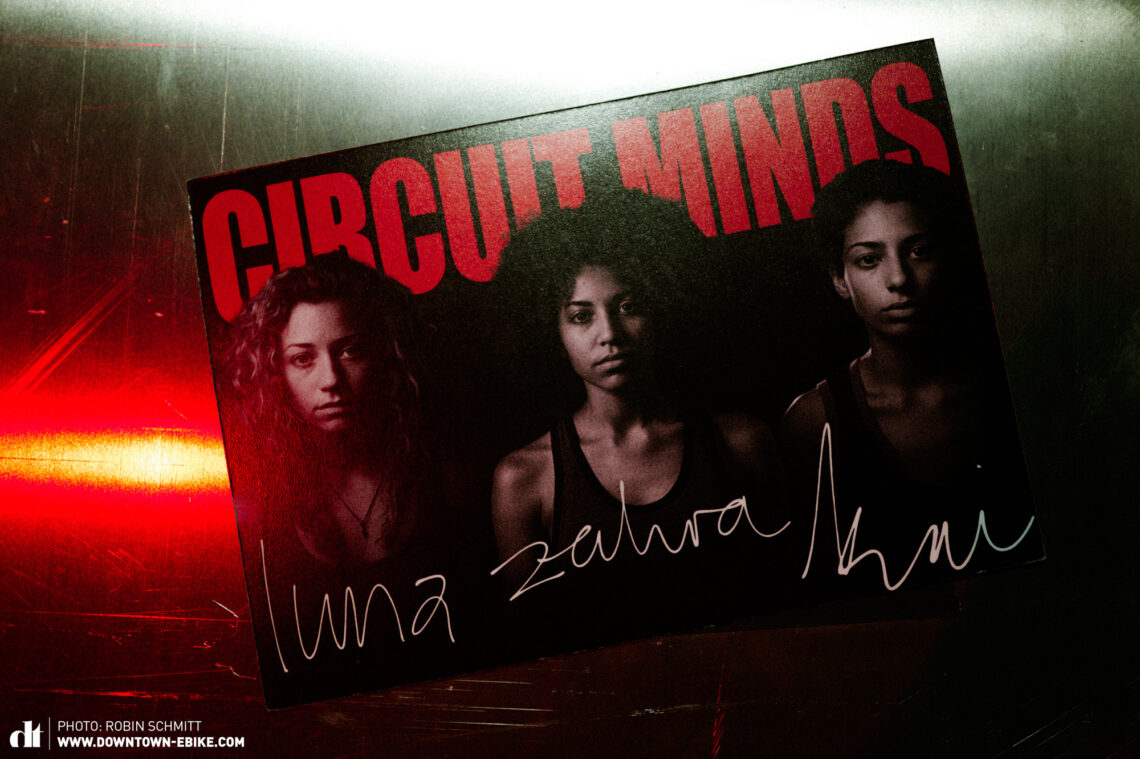
DOWNTOWN: To give our readers some context, tell us about your studies. We met your professor, Andreas, briefly earlier: you seem to have the coolest professor ever. His course “Craving Future Realities” seems to conduct the most tangible kind of futurism we’ve ever seen. Instead of getting caught up in theories, visions, and predictions, he lets his students explore what they can do and achieve with the latest technologies, without judgement or evaluation. And only then do you assess what this means for the present and the future.
Rosi: Yes, definitely, Andreas Ingerl is the world’s best professor to me. I’ve been studying communication design in Berlin at HTW, the University of Applied Sciences, since 2021, now entering my 5th semester. I ended up in Andreas’ course “Craving Future Realities” by chance. Each semester he has a different topic, but it is always about technologies and future research. This time the task was: do what you want, do something with artificial intelligence, and make it groundbreaking! This open task has resulted in very different projects, which we’re presenting here at Ars Electronica.
DOWNTOWN: How long did it take you from having the idea for the band to releasing the record?
Rosi: The Circuit Minds project took about 4 months to create.
DOWNTOWN: What were your biggest challenges?
Rosi: I had to listen to about four or five hundred bad AI songs to find two that actually worked, and that I could work with. And that process deadened something in me. Listening to so much bad music is painful. And there’s also always this question: will it even work? How will I portray it? That actually remained somewhat unanswered until the very end. But I always knew that I wanted to bring the music into the analogue world when it was done. I wanted to introduce a bit of punk-rock attitude – because that’s who I am – and present my work in exactly the same way.
DOWNTOWN: Cool. What tools did you use?
Rosi: I used Aver to generate the music, which creates music based on my notes and also writes out the notes for me, which means that you can continue working with them quite easily. The only real part of the whole thing is my voice. I enriched that with lyrics generated by ChatGPT, and all the visual stuff (i.e. the images) are from Midjourney.
DOWNTOWN: How proud are you of the result?
Rosi: I’m very, very critical, and I was throughout the entire process. But the response I’ve received also makes me proud of how it all turned out. I actually keep thinking to myself: “Oh God, I could have done more, and I could have done Spotify and a website and everything”. But I also like the magic of having just this one tape that you can see here, that you can only listen to here, and that it’s this analogue thing. The generated concert and rehearsal photos, tickets, VIP passes, and merch that’s lying around here everywhere makes it difficult for visitors to understand that my band doesn’t actually exist.
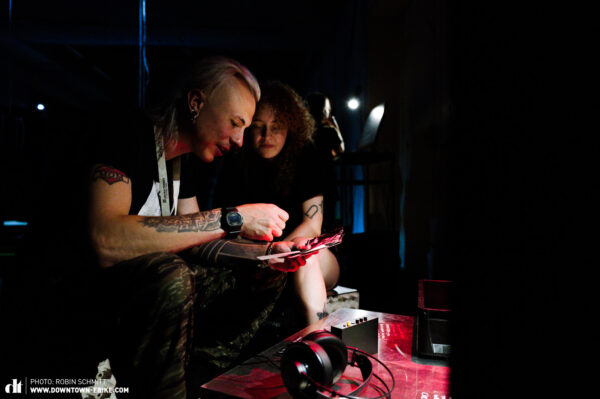
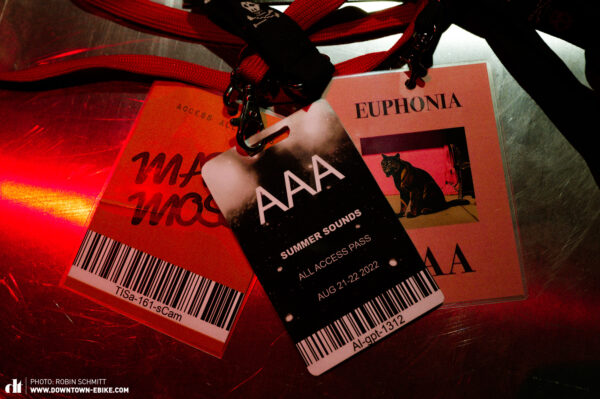
DOWNTOWN: It’s all about storytelling! The mood, photos, your entire setting – everything you’ve built here seems incredibly real – amazing!
Rosi: Yes, thank you, I enjoy it too, and that’s ultimately what it was: a fun process, because everything first existed in the cloud. I had to generate all these songs and all these photos. That is, I sat at the computer for 8 hours every day for 4 months, and eventually started arguing with artificial intelligence. Because if you’re creative and nothing good comes of it, then you’re partially to blame. What I mean is, I’m not directly to blame, but I want something from the AI that it’s not giving to me. And then it turns into this very, very strange relationship!
DOWNTOWN: Do you then blame yourself because you’re prompting the AI incorrectly or can’t express what it needs, or is it the AI’s fault?
Rosi: Yes, and yes. Prompting is like learning a foreign language, and that includes knowing how prompts are weighted. Which individual parameters are actually applied, and which aren’t? Those are things you must learn, yet it stays trial and error, and the AI doesn’t always do what you want, and you get annoyed.
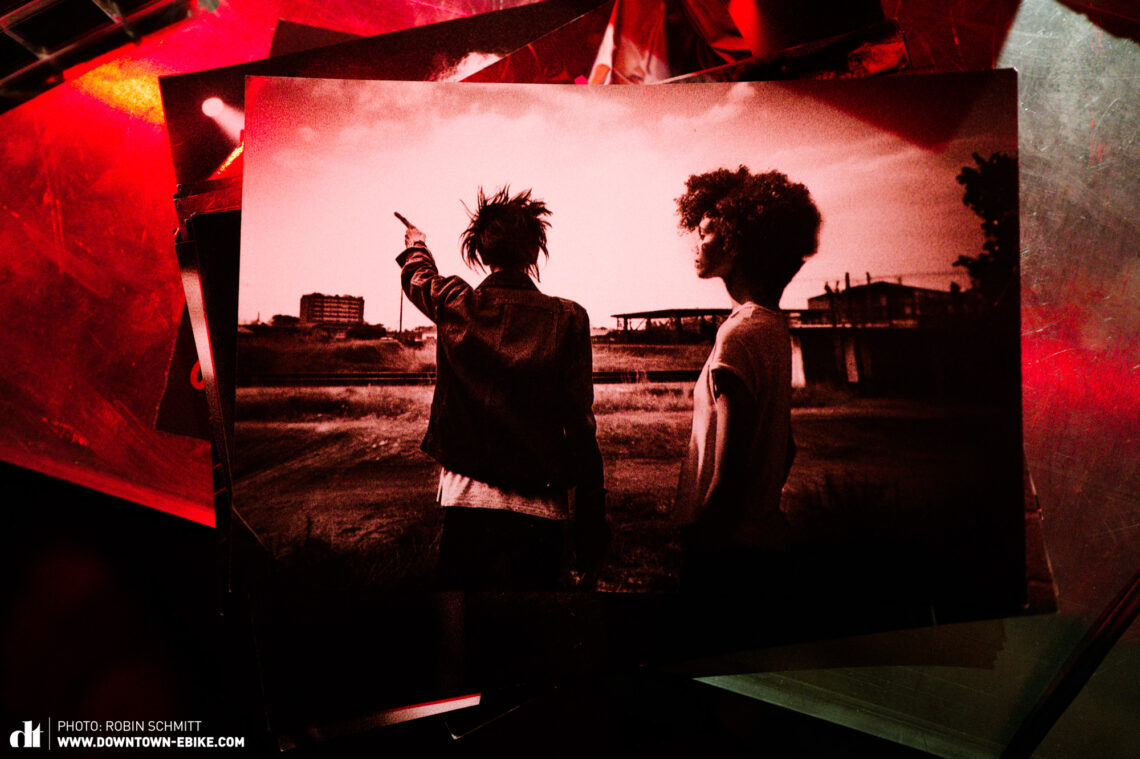
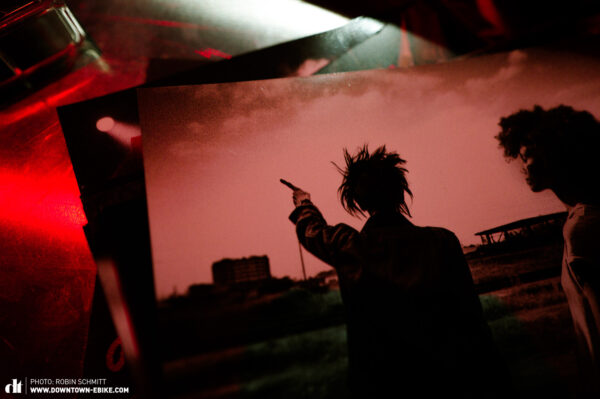
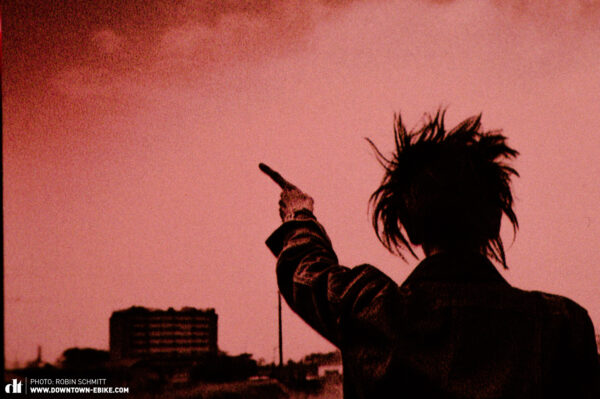
DOWNTOWN: If you take a closer look, you can see that the concert and rehearsal photos, at least, are AI-generated.
Rosi: Yes, exactly. AI currently still has a few typical problems. But the interesting thing is that people who don’t deal with AI and don’t know much about it really don’t see these mistakes. People who deal with it, like those from our studies for example, see it immediately.
We are the generation that actually knows that this planet is doomed to perish anyway. And whether that happens because of the climate crisis or AI, what difference does it make?
Rosi Pernthaller, bandleader and manager of Circuit Minds, HTW Berlin student
DOWNTOWN: Where do you see the potential in AI, and what do you consider to be the worst case?
Rosi: It’s just the next step. The Internet is mainly used as a tool for research and inspiration: Pinterest is the best example of this – everyone who does anything with graphics goes to Pinterest first and looks at what is being done in the field, and then imitates that or tries to be inspired by it. And I believe AI will do the same in the creative world in that sense. That means that we can practically use it to get a kick-start in terms of creative work. Of course, it will simultaneously wipe out many areas and make them superfluous. That is why I believe that as humanity we must now consider how to work with it and how to find solutions to deal with it.
I see the same thing in completely different areas. Currently, everyone is complaining because bachelor theses are now being done with ChatGPT. Maybe the whole idea of a bachelor’s thesis is simply outdated, and we must adapt student evaluation to a different, modern age. Of course, I personally find the whole AI thing super fucking creepy – just the fact that I’m presenting a band that many people think is real, which really surprises me. I didn’t think that was possible, that you can practically fool people like that. On the one hand, it’s incredibly funny, which I really enjoy. On the other hand, I wonder: okay, when and where am I being fooled myself, and what does it hold for the future of society as a whole if we no longer know where to draw the line between truth and falsehood? And what kind of dimensions might this take on when we may no longer have control over it? On the other hand, we are the generation that actually knows that this planet is doomed to perish anyway. And whether that happens because of the climate crisis or AI, what difference does it make? That’s why we want to use AI for things that it can help us with right now, for what we enjoy, and to explore the future.
For us, the projects are about exploring valid paths into the future. We’re not categorising things as good or bad, but first want to explore what is technically possible. Then we discuss what this can mean for the future, to ultimately define avenues for new technologies.
Prof. Andreas Ingerl, HTW Berlin
DOWNTOWN: Why do you consider this to be a hoax and not perhaps a different kind of creative process?
Rosi: Those are two different things, so, another creative process – I’m totally with you on that. But in this case, I’m lying on purpose. I could have written on the album cover that it is an AI-generated band and none of it is real. But I didn’t, I didn’t want to.
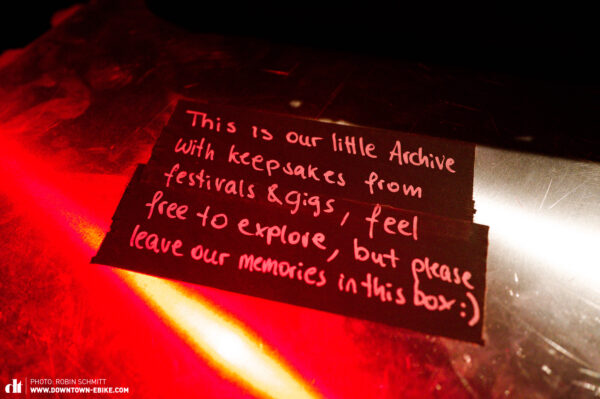
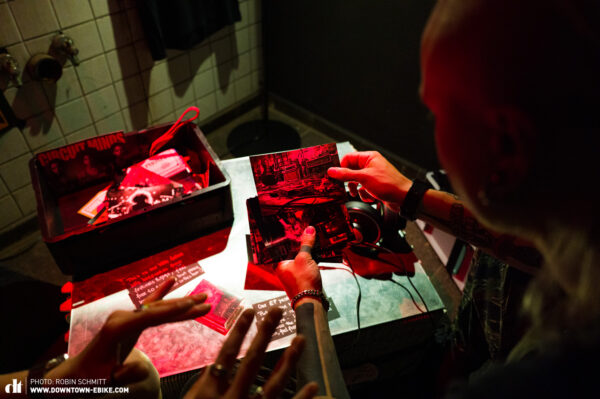
Of course, it’s good to question what we define as genuine, and I believe that we’re currently still at the point of being able to make that distinction.
Rosi Pernthaller, bandleader and manager of Circuit Minds, HTW Berlin student
DOWNTOWN: And why isn’t it real? I can listen to the music and enjoy it – it feels very real.
Rosi: Well, not real in the sense of… good question, very, very good question… not real, because the people in these photos don’t exist. This music was not created by musicians. There were musicians involved, because it must still get processed, but these people on the cover never existed, the stories never existed, the name is AI-generated, the logo, all the festival flyers, the backstage passes – none of it is real or made by humans. Of course, it’s good to question what we define as genuine, and I believe that we’re currently still at the point of being able to make that distinction. I believe this is exactly what will change in the next few years: the definition of real and fake in the sense of human or artificial intelligence.
Now I just need groupies, then everything is great!
Rosi Pernthaller, bandleader and manager of Circuit Minds, HTW Berlin student
DOWNTOWN: The Beatles locked themselves in a room somewhere and rehearsed for weeks and months, using real instruments. How does one’s own appreciation of prompting, for creating with AI, contrast with that?
Rosi: So, I think we are still at the point where this is all seen as fake: everything that happens with AI, e.g. ChatGPT is fake. But it’s a different perspective. Take Google, for example: If we’re searching for something for science, we use Google, compile information, check the sources, and then draw conclusions from them. Our parents used to do this in the library with books, and we now have this tool, ChatGPT. In the end, it’s just a research tool, it doesn’t do that much and isn’t as smart as people think. It’s impressive, yes, but it has a lot of limits, and so you’ve got to ask: how will this change, and how will the perception of fakeness also change?
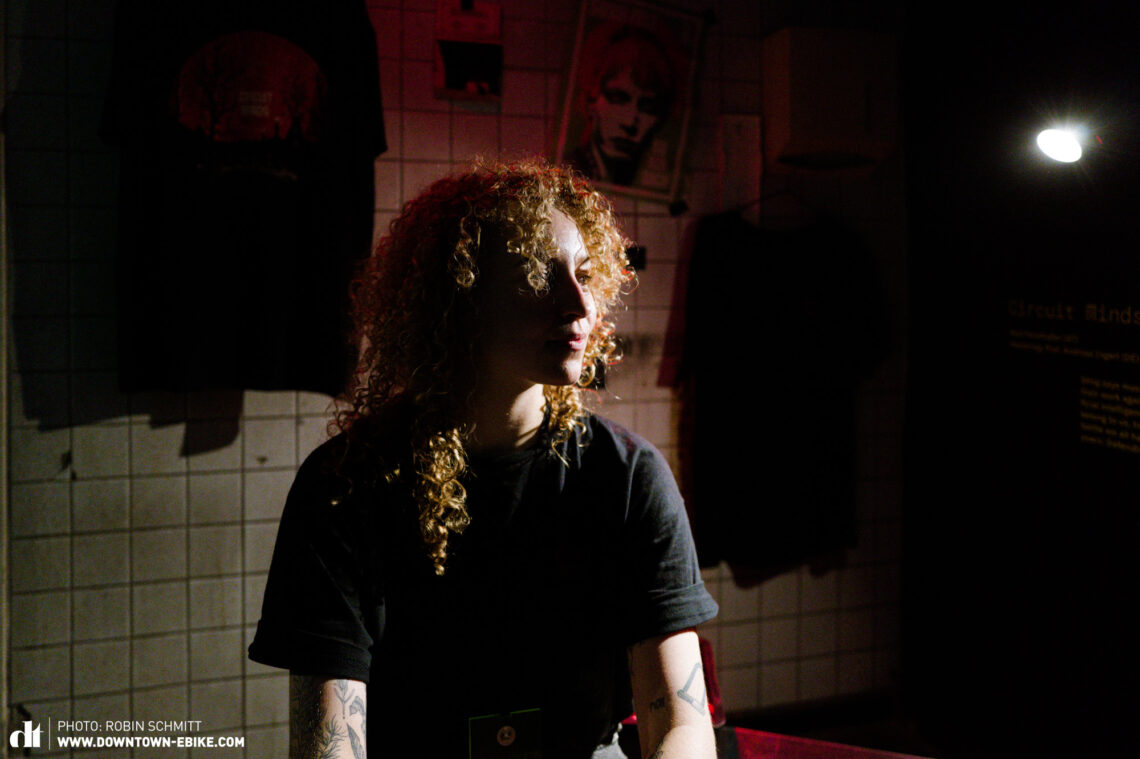
DOWNTOWN: But do you feel like a bandleader, a band manager, and a band marketing manager, nonetheless?
Rosi: A bit yes, well, I do have the feeling – now here in Linz at Ars Electronica – that I’m on tour. I feel a lot like a rock star right now. That’s pretty awesome. Now I just need groupies, then everything is great!
DOWNTOWN: Those probably can’t be generated yet, right? Rosi, thank you for your insights, and all the best for the next concert!
Rosi: Haha, I don’t think so! Thank you.
Rosi’s project of an AI-generated band raises many questions. However, one thing is clear: artificial intelligence is not just a technical revolution, but also a cultural one. The boundaries between authenticity and deception are more blurred than ever – or does that no longer matter? Rather, could it be about what art and music do to us? After the interview, we put the headphones back on and pressed play on the cassette player.
More information about the university course, visit cfr.vision
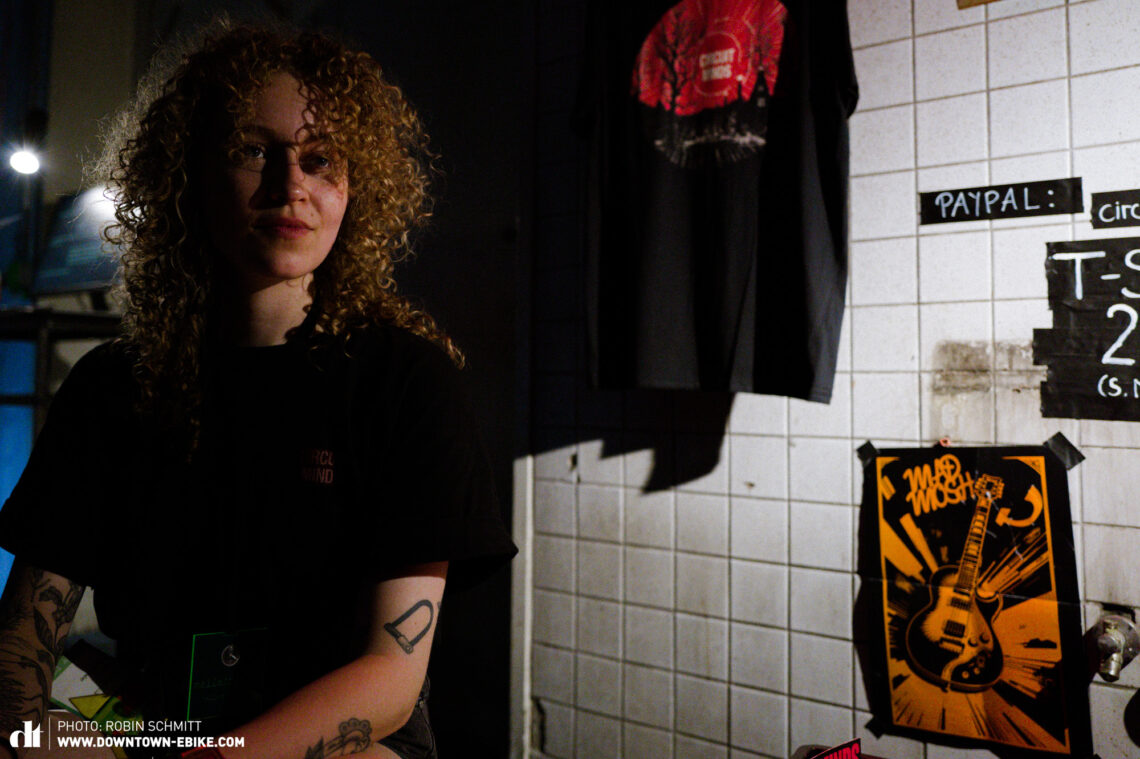
Words: Robin Schmitt, Susanne Feddersen, Felicia Nastal Photos: Robin Schmitt




